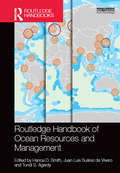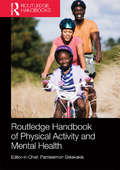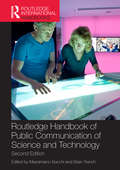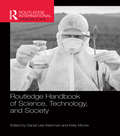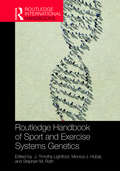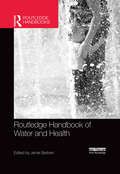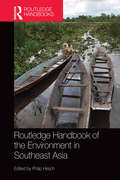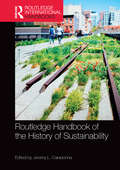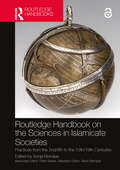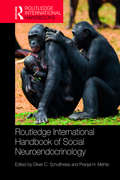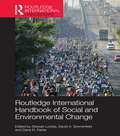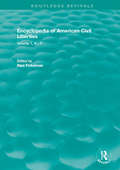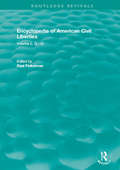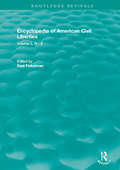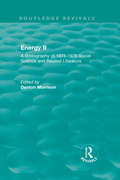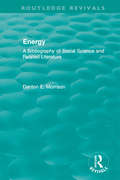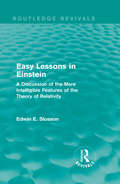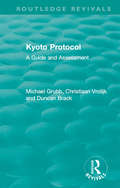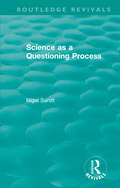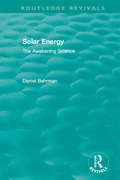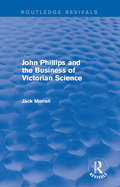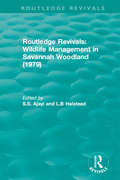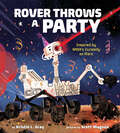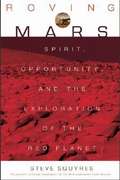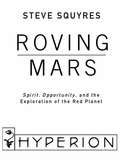- Table View
- List View
Routledge Handbook of Ocean Resources and Management (Routledge Environment and Sustainability Handbooks)
by Hance D. Smith Tundi S. Agardy Juan Luis Suárez de ViveroThis comprehensive handbook provides a global overview of ocean resources and management by focusing on critical issues relating to human development and the marine environment, their interrelationships as expressed through the uses of the sea as a resource, and the regional expression of these themes. The underlying approach is geographical, with prominence given to the biosphere, political arrangements and regional patterns – all considered to be especially crucial to the human understanding required for the use and management of the world's oceans. Part one addresses key themes in our knowledge of relationships between people and the sea on a global scale, including economic and political issues, and understanding and managing marine environments. Part two provides a systematic review of the uses of the sea, grouped into food, ocean space, materials and energy, and the sea as an environmental resource. Part three on the geography of the sea considers management strategies especially related to the state system, and regional management developments in both core economic regions and the developing periphery. The primary themes within each chapter are governance (including institutional and legal bases); policy – sets of ideas governing management; and management, both technical and general.
Routledge Handbook of Physical Activity and Mental Health (Routledge International Handbooks Ser.)
by Panteleimon EkkekakisA growing body of evidence shows that physical activity can be a cost-effective and safe intervention for the prevention and treatment of a wide range of mental health problems. As researchers and clinicians around the world look for evidence-supported alternatives and complements to established forms of therapy (medication and psychotherapy), interest in physical activity mounts. The Routledge Handbook of Physical Activity and Mental Health offers the most comprehensive review of the research evidence on the effects of physical activity on multiple facets of mental health. Written by a team of world-leading international experts, the book covers ten thematic areas: physical activity and the ‘feel good’ effect anxiety disorders depression and mood disorders self-perceptions and self-evaluations cognitive function across the lifespan psychosocial stress pain energy and fatigue addictions quality of life in special populations. This volume presents a balanced assessment of the research evidence, highlights important directions for future work, and draws clear links between theory, research, and clinical practice. As the most complete and authoritative resource on the topic of physical activity and mental health, this is essential reading for researchers, students and practitioners in a wide range of fields, including clinical and health psychology, psychiatry, neuroscience, behavioural and preventive medicine, gerontology, nursing, public health and primary care.
Routledge Handbook of Public Communication of Science and Technology: Second edition (Routledge International Handbooks #28)
by Massimiano Bucchi Brian TrenchCommunicating science and technology is a high priority of many research and policy institutions, a concern of many other private and public bodies, and an established subject of training and education. Over the past few decades, the field has developed and expanded significantly, both in terms of professional practice and in terms of research and reflection. The Routledge Handbook of Public Communication of Science and Technology provides a state-of-the-art review of this fast-growing and increasingly important area, through an examination of the research on the main actors, issues, and arenas involved. In this brand-new revised edition, the book brings the reviews up-to-date and deepens the analysis. As well as substantial reworking of many chapters, it gives more attention to digital media and the global aspects of science communication, with the inclusion of four new chapters. Several new contributors are added to leading mass-communication scholars, sociologists, public-relations practitioners, science writers, and others featured herein. With key questions for further discussion highlighted in each chapter, the handbook is a student-friendly resource and its scope and expert contributors mean it is also ideal for both practitioners and professionals working in the field. Combining the perspectives of different disciplines and of different geographical and cultural contexts, this original text provides an interdisciplinary and global approach to the public communication of science and technology. It is a valuable resource for students, researchers, educators, and professionals in media and journalism, sociology, the history of science, and science and technology.
Routledge Handbook of Science, Technology, and Society (Routledge International Handbooks)
by Kelly Moore Daniel Lee KleinmanOver the last decade or so, the field of science and technology studies (STS) has become an intellectually dynamic interdisciplinary arena. Concepts, methods, and theoretical perspectives are being drawn both from long-established and relatively young disciplines. From its origins in philosophical and political debates about the creation and use of scientific knowledge, STS has become a wide and deep space for the consideration of the place of science and technology in the world, past and present. The Routledge Handbook of Science, Technology and Society seeks to capture the dynamism and breadth of the field by presenting work that pushes the reader to think about science and technology and their intersections with social life in new ways. The interdisciplinary contributions by international experts in this handbook are organized around six topic areas: embodiment consuming technoscience digitization environments science as work rules and standards This volume highlights a range of theoretical and empirical approaches to some of the persistent – and new – questions in the field. It will be useful for students and scholars throughout the social sciences and humanities, including in science and technology studies, history, geography, critical race studies, sociology, communications, women’s and gender studies, anthropology, and political science.
Routledge Handbook of Sport and Exercise Systems Genetics (Routledge International Handbooks)
by Stephen M. Roth J. Timothy Lightfoot Monica J. HubalTechnological advances over the last two decades have placed genetic research at the forefront of sport and exercise science. It provides potential answers to some of contemporary sport and exercise’s defining issues and throws up some of the area’s most challenging ethical questions, but to date, it has rested on a fragmented and disparate literature base. The Routledge Handbook of Sport and Exercise Systems Genetics constitutes the most authoritative and comprehensive reference in this critical area of study, consolidating knowledge and providing a framework for interpreting future research findings. Taking an approach which covers single gene variations, through genomics, epigenetics, and proteomics, to environmental and dietary influences on genetic mechanisms, the book is divided into seven sections. It examines state-of-the-art genetic methods, applies its approach to physical activity, exercise endurance, muscle strength, and sports performance, and discusses the ethical considerations associated with genetic research in sport and exercise. Made up of contributions from some of the world’s leading sport and exercise scientists and including chapters on important topical issues such as gene doping, gender testing, predicting sport performance and injury risk, and using genetic information to inform physical activity and health debates, the handbook is a vital addition to the sport and exercise literature. It is an important reference for any upper-level student, researcher, or practitioner working in the genetics of sport and exercise or exercise physiology, and crucial reading for any social scientist interested in the ethics of sport.
Routledge Handbook of Water and Health (Routledge Environment and Sustainability Handbooks)
by Jamie BartramThis comprehensive handbook provides an authoritative source of information on global water and health, suitable for interdisciplinary teaching for advanced undergraduate and postgraduate students. It covers both developing and developed country concerns. It is organized into sections covering: hazards (including disease, chemicals and other contaminants); exposure; interventions; intervention implementation; distal influences; policies and their implementation; investigative tools; and historic cases. It offers 71 analytical and engaging chapters, each representing a session of teaching or graduate seminar. Written by a team of expert authors from around the world, many of whom are actively teaching the subject, the book provides a thorough and balanced overview of current knowledge, issues and relevant debates, integrating information from the environmental, health and social sciences.
Routledge Handbook of the Environment in Southeast Asia
by Philip HirschThe environment is one of the defining issues of our times, and it is closely linked to questions and dilemmas surrounding economic development. Southeast Asia is one of the world’s most economically and demographically dynamic regions, and it is also one in which a host of environmental issues raise themselves. The Routledge Handbook of the Environment in Southeast Asia is a collection of 30 chapters dealing with the most significant scholarly debates in this rapidly growing field of study. Structured in four main parts, it gives a comprehensive regional overview of, and insight into, the environment in Southeast Asia. Wide-ranging and balanced, this handbook promotes scholarly understanding of how environmental issues are dealt with from diverse theoretical perspectives. It offers a detailed empirical understanding of the myriad environmental problems and challenges faced in Southeast Asia. This is the first publication of its kind in this field; a helpful companion for a global audience and for scholars of Southeast Asian studies from a variety of disciplines.
Routledge Handbook of the History of Sustainability (Routledge Environment and Sustainability Handbooks)
by Jeremy L. CaradonnaThe Routledge Handbook of the History of Sustainability is a far-reaching survey of the deep and contemporary history of sustainability. This innovative resource will help to define the history of sustainability as an identifiable field. It provides a unique resource for advanced undergraduates, graduate students, and scholars, and delivers essential context for understanding the current state and future path of the sustainability movement. The history of sustainability is an increasingly important domain within the discipline of history, which draws on an interdisciplinary set of fields, ranging from energy studies, transportation, and urbanism to environmental history, economics, and philosophy. Key sections in this handbook cover the historiography of sustainability, resilience and collapse in historical societies, the deep roots of sustainability (seventeenth century to nineteenth century), the recent history of sustainability (twentieth century to present), and core issues and key debates in sustainability. This handbook is an invaluable research and teaching tool for those interested in the history and development of sustainability and an essential resource for the many sustainability studies programs that now exist in the world's universities.
Routledge Handbook on the Sciences in Islamicate Societies: Practices from the 2nd/8th to the 13th/19th Centuries
by Sonja BrentjesThe Routledge Handbook on the Sciences in Islamicate Societies provides a comprehensive survey on science in the Islamic world from the 8th to the 19th century. Across six sections, a group of subject experts discuss and analyze scientific practices across a wide range of Islamicate societies. The authors take into consideration several contexts in which science was practiced, ranging from intellectual traditions and persuasions to institutions, such as courts, schools, hospitals, and observatories, to the materiality of scientific practices, including the arts and craftsmanship. Chapters also devote attention to scientific practices of minority communities in Muslim majority societies, and Muslim minority groups in societies outside the Islamicate world, thereby allowing readers to better understand the opportunities and constraints of scientific practices under varying local conditions. Through replacing Islam with Islamicate societies, the book opens up ways to explain similarities and differences between diverse societies ruled by Muslim dynasties. This handbook will be an invaluable resource for both established academics and students looking for an introduction to the field. It will appeal to those involved in the study of the history of science, the history of ideas, intellectual history, social or cultural history, Islamic studies, Middle East and African studies including history, and studies of Muslim communities in Europe and South and East Asia.
Routledge International Handbook of Social Neuroendocrinology (Routledge International Handbooks)
by Oliver C. Schultheiss Pranjal H. MehtaThe Routledge International Handbook of Social Neuroendocrinology is an authoritative reference work providing a balanced overview of current scholarship spanning the full breadth of the rapidly developing field of social neuroendocrinology. Considering the relationships between hormones, the brain, and social behavior, this collection brings together groundbreaking research in the field for the first time. <P><P> Featuring 39 chapters written by leading researchers, the handbook offers impressive breadth of coverage. It begins with an overview of the history of social neuroendocrinology before discussing its methodological foundations and challenges. Other topics covered include state-of-the-art research on dominance and aggression; social affiliation; reproduction and pair bonding (e.g., sexual behavior, sexual orientation, romantic relationships); pregnancy and parenting; stress and emotion; cognition and decision making; social development; and mental and physical health. The handbook adopts a lifespan approach to the study of social neuroendocrinology throughout, covering the role that hormones play during gestation, childhood, adolescence, and adulthood. It also illustrates the evolutionary forces that have shaped hormone-behavior associations across species, including research on humans, non-human primates, birds, and rodents. <P><P> The handbook will serve as an authoritative reference work for researchers, students, and others intrigued by this topic, while also inspiring new lines of research on interactions among hormones, brain, and behavior in social contexts.
Routledge International Handbook of Social and Environmental Change (Routledge International Handbooks)
by Stewart Lockie Dana R. Fisher David A. SonnenfeldToday, the risks associated with global environmental change and the dangers of extreme climatic and geological events remind us of humanity’s dependence on favourable environmental conditions. Our relationships with the landscapes and ecologies that we are a part of, the plants and animals that we share them with, and the natural resources that we extract, lie at the heart of contemporary social and political debates. It is no longer possible to understand key social scientific concerns without at the same time also understanding contemporary patterns of ecosystem change. The Routledge International Handbook of Social and Environmental Change reviews the major ways in which social scientists are conceptualizing more integrated perspectives on society and nature, from the global to local levels. The chapters in this volume, by international experts from a variety of disciplines, explore the challenges, contradictions and consequences of social–ecological change, along with the uncertainties and governance dilemmas they create. The contributions are based around the themes of: Climate change, energy, and adaptation Urban environmental change and governance Risk, uncertainty and social learning (Re)assembling social-ecological systems With case studies from sectors across both developed and developing worlds, the Handbook illustrates the inter-connectedness of ecosystem health, natural resource condition, livelihood security, social justice and development. It will be of interest for students and scholars across the social sciences and natural sciences, as well as to those interested and engaged in environmental policy at all levels.
Routledge Revivals (2006): Volume 1, A - F
by Paul FinkelmanOriginally published in 2006, the Encyclopedia of American Civil Liberties, is a comprehensive 3 volume set covering a broad range of topics in the subject of American Civil Liberties. The book covers the topic from numerous different areas including freedom of speech, press, religion, assembly and petition. The Encyclopedia also addresses areas such as the Constitution, the Bill of Rights, slavery, censorship, crime and war. The book’s multidisciplinary approach will make it an ideal library reference resource for lawyers, scholars and students.
Routledge Revivals (2006): Volume 2, G - Q
by Paul FinkelmanOriginally published in 2006, the Encyclopedia of American Civil Liberties, is a comprehensive 3 volume set covering a broad range of topics in the subject of civil liberties in America. The book covers the topic from numerous different areas including freedom of speech, press, religion, assembly and petition. The Encyclopedia also addresses areas such as the Constitution, the Bill of Rights, slavery, censorship, crime and war. The book’s multidisciplinary approach will make it an ideal library reference resource for lawyers, scholars and students.
Routledge Revivals (2006): Volume 3, R - Z
by Paul FinkelmanOriginally published in 2006, the Encyclopedia of American Civil Liberties, is a comprehensive 3 volume set covering a broad range of topics in the subject of civil liberties in America. The book covers the topic from numerous different areas including freedom of speech, press, religion, assembly and petition. The Encyclopedia also addresses areas such as the Constitution, the Bill of Rights, slavery, censorship, crime and war. The book’s multidisciplinary approach will make it an ideal library reference resource for lawyers, scholars and students.
Routledge Revivals: A Bibliography of 1975-1976 Social Science and Related Literature (Routledge Revivals)
by Denton MorrisonOriginally published in 1977, Energy II provides a comprehensive and updated bibliography of energy in the context of the social sciences. Following on from the first bibliography published in 1975, this book offers a fully updated bibliography, and argues that energy problems are best seen in the context of social phenomena, such as social attitudes, social behaviours, social institutions and structures and populations. The book provides a unique list of references that examine energy problems outside of the context of social factors.
Routledge Revivals: A Bibliography of Social Science and Related Literature (Routledge Revivals)
by Denton E. MorrisonOriginally published in 1975, Energy provides a comprehensive bibliography of energy in the context of the social sciences. The book argues that energy problems are best seen in the context of social phenomena, such as social attitudes, social behaviours, social institutions and structures and populations. The authors argue that to examine energy problems outside of the context of social factors is to lack a full and detailed examination of the subject. The bibliography provides a comprehensive collection of sources from a range of areas in the social sciences on the subject of energy.
Routledge Revivals: A Discussion of the More Intelligible Features of the Theory of Relativity (Routledge Revivals)
by Edwin E. SlossonFirst published in 1922, this book represents the first attempt to popularise the more accessible aspects of Albert Einstein’s general theory of relativity. Eschewing the mathematical components that put the theory beyond many people’s grasp, the author employs metaphorical examples and thought experiments to convey the fundamental ideas and assertions of one of physics’ most famous principles — which remains the accepted description of gravitation more than a century after its first publication. This book will of interest to students of physics as an introductory basis to aid further study.
Routledge Revivals: A Guide and Assessment (Routledge Revivals)
by Michael Grubb Duncan Brack Christiaan VrolijkOriginally published in 1999, The Kyoto Protocol provides a detailed discussion on the history, terms and implications of the Kyoto Protocol 1997. It explains the meaning of provision on emissions trading and other flexibility mechanisms, and provides a quantitative analysis using the Energy and Environment Programme's emissions trading model. It also contains the full text of the Kyoto Protocol and developments at the 4th Conference of the Parties in December 1998. This book will be of interest to academics working in the field of climate change, as well as the broader area of environment and sustainability.
Routledge Revivals: Science as a Questioning Process (Routledge Revivals)
by Nigel SanittFirst published in 1996, Science as a Questioning Process evaluates scientific theories through from Darwinian evolution to relativity, and from quantum theory to cosmology. It offers an examination of these theories, in terms of a compromise between resolvable empirical questions, and theoretical questions left unresolved. The book asks questions that deal with both intellectual and public concern about what science tells us, and how reliable it is. Through this novel perspective, the book examines science in the context of everyday culture and the role it plays in everyday life. This book will be of interest to anyone working in the fields of philosophy, sociology and science.
Routledge Revivals: The Awakening Science (Routledge Revivals)
by Daniel BehrmanOriginally published in 1979, Solar Energy provides a tour of the world of solar energy and asks two key questions: is solar energy the key to the future of our energy needs, and what are the facts and potential of this source of renewable power. The book examines solar energy from the past, to modern plans for designing domestic solar housing, and looks at the sites and the technology applied to harness the Sun's power, such as the energy potential of windmills and the equatorial oceans. Behrman reports on the progress of scientists and manufacturers in making solar energy a viable competitor in the energy market, and studies the projections of a future energy crop for energy plantations.
Routledge Revivals: The Fiction of the Brotherhood of the Rosy Cross (Routledge Revivals)
by Jack MorrellFirst published in 2005, this book represents the first full length biography of John Phillips, one of the most remarkable and important scientists of the Victorian period. Adopting a broad chronological approach, this book not only traces the development of Phillips’ career but clarifies and highlights his role within Victorian culture, shedding light on many wider themes. It explores how Phillips’ love of science was inseparable from his need to earn a living and develop a career which could sustain him. Hence questions of power, authority, reputation and patronage were central to Phillips’ career and scientific work. Drawing on a wealth of primary sources and a rich body of recent writings on Victorian science, this biography brings together his personal story with the scientific theories and developments of the day, and fixes them firmly within the context of wider society.
Routledge Revivals: Wildlife Management in Savannah Woodland (Routledge Revivals)
by S.S. Ajayi and L.B. HalsteadOriginally published in 1979, Wildlife Management in Savannah Woodland provides a multidisciplinary approach to the environment. Developed by local scientists with a deep knowledge and understanding of the local situation, the book provides a pragmatic and realistic approach to West African conditions.
Rover Throws a Party: Inspired by NASA's Curiosity on Mars
by Kristin L. GrayInspired by NASA's Curiosity rover, this is the story of a lonely Mars rover who plans the best birthday party in the solar system.It's Rover's anniversary on Mars! Time to celebrate by throwing the best party this planet has ever seen. Rover hands out invitations all over town, but it seems like he's the only one around. Will anyone come to the party, or will Rover be all alone on his big day? In 2013, NASA programmed their Curiosity rover to hum "Happy Birthday to You" in honor of its first year on Mars. Inspired by this anecdote, this is the tale of a lonely rover and his party, accompanied by fascinating Mars rover facts that help explain the real science behind the story. This fun birthday tale provides an accessible, kid-friendly look at one of NASA's coolest programs.
Roving Mars: Spirit, Opportunity, And The Exploration Of The Red Planet
by Steve SquyresIt’s the age-old question: Is there life on Mars? Steve Squyres, lead scientist of NASA’s Mars Exploration Rover mission, sets out to answer that question and relates his findings in this riveting first-person narrative account.<P> Steve Squyres is the face and voice of NASA’s Mars Exploration Rover mission. Squyres dreamed up the mission in 1987, saw it through from conception in 1995 to a successful landing in 2004, and serves as the principal scientist of its $400 million payload. He has gained a rare inside look at what it took for Rovers Spirit and Opportunity to land on the red planet in January 2004 -- and knows firsthand their findings.
Roving Mars: Spirit, Opportunity, and the Exploration of the Red Planet
by Steven SquyresSteve Squyres is the face and voice of NASA's Mars Exploration Rover mission. Squyres dreamed up the mission in 1987, saw it through from conception in 1995 to a successful landing in 2004, and serves as the principal scientist of its $400 million payload. He has gained a rare inside look at what it took for rovers Spirit and Opportunity to land on the red planet in January 2004--and knows firsthand their findings.
